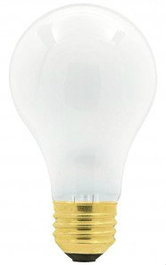 At a recent lighting expo, the VP of government affairs for Philips Lighting, John Pouland, basically predicted the extinction of light bulbs, suggesting that we will eventually just buy fixtures that light up without the need for a separate bulb. With old light bulb technology, that would be an incredible waste given the relatively short lifespan of light bulbs. But with LED technology -- and no doubt even newer technologies on the horizon -- lighting can last a generation, and perhaps that's long enough for a fixture to last. Of course there are some obvious questions about whether this will happen, and when. For instance, it's long been possible to purchase a modem and router as a single technology, but many IT people recommend still buying them as separate devices; this is useful if one function breaks or needs to be upgraded while the other function still works, and you don't want to have to pay to replace it all. Another consideration: in the workplace, fixtures are usually just functional; but in some cases at both home and work we invest in special fixtures because of their beauty. This might be something we want lasting all our lives and even passing down in the family. What happens if the light is built in and eventually fails? Time to throw out (or recycle) the fixture. What do you think? Will we still buy separate light bulbs, or will they all become integrated with fixtures? And as integration becomes possible and affordable, will legislation demand it? Will it allow exceptions (as there are for certain incandescent bulbs) for fixtures that are not just designed for light, but for art? Comments are closed.
|
This blog's content is copyright © 2014-19 Lighting Supply.
